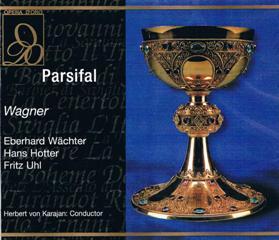Wagner - Parsifal (Karajan) [1998]
Wagner - Parsifal (Karajan) [1998]

Disc: 1 1. Parsifal: Prelude 2. Parsifal: Act One: He! Ho! Waldhuter ihr (Gurnemanz) 3. Parsifal: Act One: Seht dort die wilde Reiterin! 4. Parsifal: Act One: Rech so!y Habt Dank!y (Amfortas) 5. Parsifal: Act One: He, Du Da! Was liegsts du dort 6. Parsifal: Act One: Ja, wann oft lange sie uns ferne blieb (Gurnemanz) 7. Parsifal: Act One: Oh, wunden - wundervoller heilige Speer! (Gurnemanz) 8. Parsifal: Act One: Titurel, der fromme Held (Gurnemanz) 9. Parsifal: Act One: Vor allem nun: der Speer kehr' uns zuruck! 10. Parsifal: Act One: Unerhortes Werk! (Gurnemanz) 11. Parsifal: Act One: Ich hab eine Mutter; Herzeleide sie heisst (Parsifal) 12. Parsifal: Act One: Vom Bade kehrt der Konig hiem (Parsifal) 13. Parsifal: Act One: Zum letzten Liebsemahle gerustet Tag fur Tag 14. Parsifal: Act One: Mei Sohn Amfortas, bist du am Amt? 15. Parsifal: Act One: Wehvolles Erbe, dem ich verfallen (Amfortas) Disc: 2 1. Parsifal: Act One: Des Weihgefasses gottlicher Gehalt 2. Parsifal: Act One: Nehmet hin meinen Leib 3. Parsifal: Act One: Wein und Brot des letzten Mahles 4. Parsifal: Act One: Was stehst du noch da? 5. Parsifal: Act Two: Prelude 6. Parsifal: Act Two: Herauf! Herauf! Zu mir! 7. Parsifal: Act Two: Da weckte dich ein andrer? He? 8. Parsifal: Act Two: Furchtbare Not! 9. Parsifal: Act Two: Haha! Gefiel er dir wohl, Amfortas 10. Parsifal: Act Two: Sie Wunde tragt jeder nach heim! 11. Parsifal: Act Two: Hier! Hier war das Tosen! 12. Parsifal: Act Two: Ihr schonen Kinder (Parsifal) 13. Parsifal: Act Two: Wie duftet ihr hold! (Parsifal) 14. Parsifal: Act Two: Parsifal! - Weile! 15. Parsifal: Act Two: Dies alles - hab ich nun getraumt? (Parsifal) 16. Parsifal: Act Two: Ich sah das Kind an seiner Muter Brust 17. Parsifal: Act Two: Wehe! Wehe! Was tat ich? Wo war ich? (Parsifal) 18. Parsifal: Act Two: Amfortas! - Die Wunde! (Parsifal) 19. Parsifal: Act Two: Gelobter Held! Entflieh dem Wahn 20. Parsifal: Act Two: Ich sah - ihn - ihn - ihn - und – lachtey Disc: 3 1. Parsifal: Act Two: O Elend, aller Rettung Flucht! (Parsifal) 2. Parsifal: Act Two: Vergeh, unseliges Weib! (Parsifal) 3. Parsifal: Act Three: Prelude 4. Parsifal: Act Three: Von dorther kam das Stohnen (Gurnemanz) 5. Parsifal: Act Three: Dieneny Dienen! 6. Parsifal: Act Three: Wenn dein Gelubde dich bindet (Gurnemanz) 7. Parsifal: Act Three: Heil mir, dass ich dich wiederfinde! (Parsifal) 8. Parsifal: Act Three: O Gnade! Hochstes Heil! (Gurnemanz) 9. Parsifal: Act Three: Und ich - ich binAs (Parsifal) 10. Parsifal: Act Three: Werd heut zu Amfortas ich noch geleitet? (Parsifal) 11. Parsifal: Act Three: So ward es uns verheissen (Gurnemanz) 12. Parsifal: Act Three: Du siehst, das ist nicht so (Gurnemanz) 13. Parsifal: Act Three: Mittag. - Die SrundAist da (Gurnemanz) 14. Parsifal: Act Three: Mein Vater! Hochgesegneter der Helden! (Amfortas) 15. Parsifal: Act Three: Nur eine Waffe taught: - die Wunde schliebt (Parsifal) Eberhard Wächter (Baritone) Tugomir Franc (Bass) Hans Hotter (Bass Baritone) Fritz Uhl (Tenor) Walter Berry (Bass Baritone) Hilde Rössl-Majdan (Alto) Christa Ludwig (Mezzo Soprano) Elisabeth Höngen (Mezzo Soprano) Vienna State Opera Chorus Vienna State Opera Orchestra Herbert von Karajan – conductor
According to his autobiography, Wagner conceived of his Parsifal as early as 1857; however, it would be his last completed work, premiered in 1882, the year before his death. His major sources were the epic poem, Parzival, by the thirteenth century poet Wolfram von Eschenbach (who incidentally, appears as a character in Tannhäuser), and the medieval romance, Perceval, ou li Contes de Graal, by Wolfram's near-contemporary, Chrétien de Troyes.
Parsifal is the story of a young man whose virtue and compassion become the salvation of the Knights of the Holy Grail. He wards off temptation and danger to regain the spear with which Christ's side was pierced on the cross; in the process he heals the king, Amfortas, of a cursed wound, and relieves the fallen woman, Kundry, from her eternal wandering.
The medieval literature about the Holy Grail is complex and varied, with roots in Celtic paganism; the identification of the Holy Grail as the cup of the Last Supper or as a vessel that caught Christ's blood at the Crucifixion did not appear until work the thirteenth century Burgundian poet, Robert de Boron. While on the surface a Christian drama (reinforced for modern audiences by its frequent adoption as an Easter season feature), Parsifal still resonates with paganism, especially through the figure of Kundry. Perhaps the strongest philosophical influence, however, came from Buddhism by way of Schopenhauer, for whom compassion and renunciation of the will, or appetites, were central concepts.
Parsifal was Wagner's only work specifically composed for the special acoustics of his Bayreuth theater (where the orchestra pit is hidden under the stage), and its particular sound-world is distinct from all of its predecessors. One of the most extraordinary aspects of the work is Wagner's orchestrally delineated sense of space distinct to each of his locations (the Grail castle of Acts One and Three; Klingsor's magic realm).
Musically, the work reaches both backwards and forward. The extraordinary music of the first act Transformation scene combines a triadic ground bass with progressively chromatic harmonies, creating an almost tangible sense of movement from the outside world to a hidden place of awe. The haunting milieu of the Grail castle in Act One is conjured by the tolling bells, the deliberately archaic a cappella choruses (Wagner studied Palestrina for these), and Titurel's offstage voice, punctuated by timpani. Kundry's raging solo passages in Act Three are almost Expressionistic in nature, with their wide, dissonant leaps, laughs, cries, and groans. The Transformation of Act Three (Titurel's funeral march) and the knights' double chorus, is constructed on harrowing dissonances, and swerves closer to atonality than any previous Wagnerian work. ---Theresa Muir, Rovi
download: yandex 4shared mediafire solidfiles mega zalivalka filecloudio anonfiles oboom
Last Updated (Tuesday, 01 July 2014 11:58)








